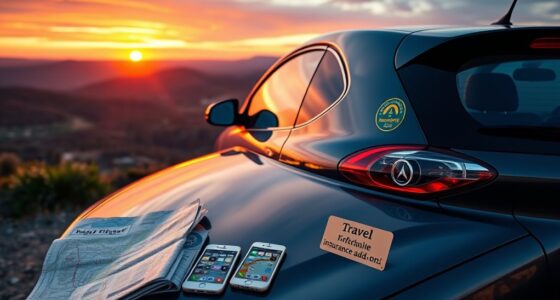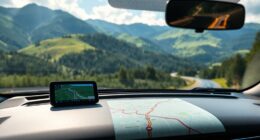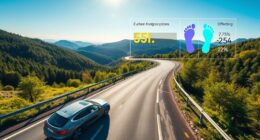To save fuel on long drives, keep a steady speed and use cruise control to reduce engine strain. Regularly maintain your vehicle and keep tires properly inflated to improve efficiency. Plan your route to avoid traffic and unnecessary stops, and turn off your engine if parked for more than a minute. By mastering these tips, you’ll stretch your fuel further and enjoy smoother journeys—discover more ways to boost your mileage ahead.
Key Takeaways
- Maintain a steady speed and use cruise control to reduce engine workload and improve fuel efficiency.
- Keep your vehicle well-maintained and tires properly inflated to minimize resistance and optimize performance.
- Plan your route with real-time traffic updates to avoid congestion and unnecessary idling.
- Drive smoothly by avoiding unnecessary speeding, rapid acceleration, and harsh braking.
- Schedule stops wisely and turn off the engine if waiting over a minute to prevent fuel waste.
Maintain Steady Speeds and Use Cruise Control
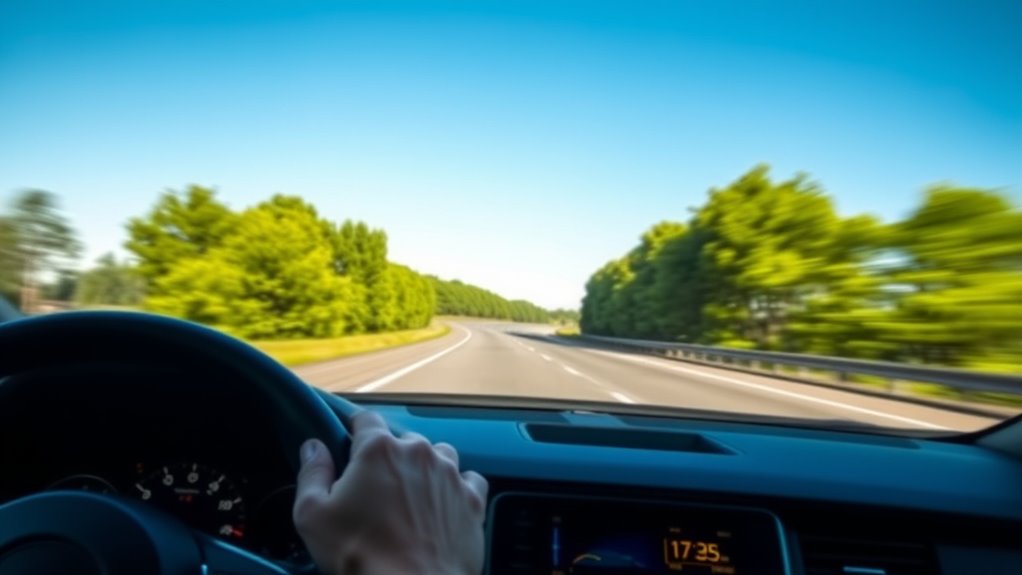
Maintaining a consistent speed can substantially boost your fuel efficiency on long drives. When you keep your speed steady, your engine doesn’t have to work harder to accelerate or brake frequently, which saves fuel. Using cruise control on highways helps you maintain that steady pace effortlessly, especially on flat terrain. It prevents unintentional speed fluctuations caused by fatigue or distractions. Avoid speeding up or slowing down unnecessarily, as these changes increase fuel consumption. Instead, set your cruise control at a moderate, steady speed within the ideal range for your vehicle. Implementing engine tuning can further optimize your vehicle’s performance and fuel economy. Additionally, understanding fuel-efficient driving techniques and how they can help you conserve fuel during long trips can be beneficial. This simple habit reduces unnecessary acceleration and braking, helping you maximize fuel economy and enjoy a more relaxed, efficient drive. Incorporating driver behavior awareness can also lead to better fuel savings over time.
Keep Your Vehicle Well-Maintained and Properly Inflated Tires

A well-maintained vehicle and properly inflated tires are essential for maximizing fuel efficiency on long drives. Regularly check your oil, air filters, and spark plugs to guarantee your engine runs smoothly. Proper tire inflation reduces rolling resistance, saving fuel and extending tire life. Maintain recommended tire pressure for your vehicle, usually found on the driver’s door frame or in your owner’s manual. Here’s a quick guide:
| Tire Pressure (PSI) | Fuel Efficiency Impact |
|---|---|
| Correct | Ideal fuel economy |
| Under-inflated | Increased fuel consumption |
| Over-inflated | Reduced traction, uneven wear |
Consistently maintaining your vehicle’s condition helps you avoid unnecessary fuel waste and breakdowns, making your long drive more efficient. Additionally, understanding energy efficiency ratings of your vehicle can help you make more informed choices to enhance fuel savings, especially when considering eco-friendly driving practices. Proper maintenance of your vehicle also supports sustainable eco-friendly living by reducing emissions and conserving resources. Regular vehicle maintenance is also aligned with automated systems that monitor and optimize vehicle performance for better fuel economy.
Plan Your Route and Avoid Unnecessary Idling
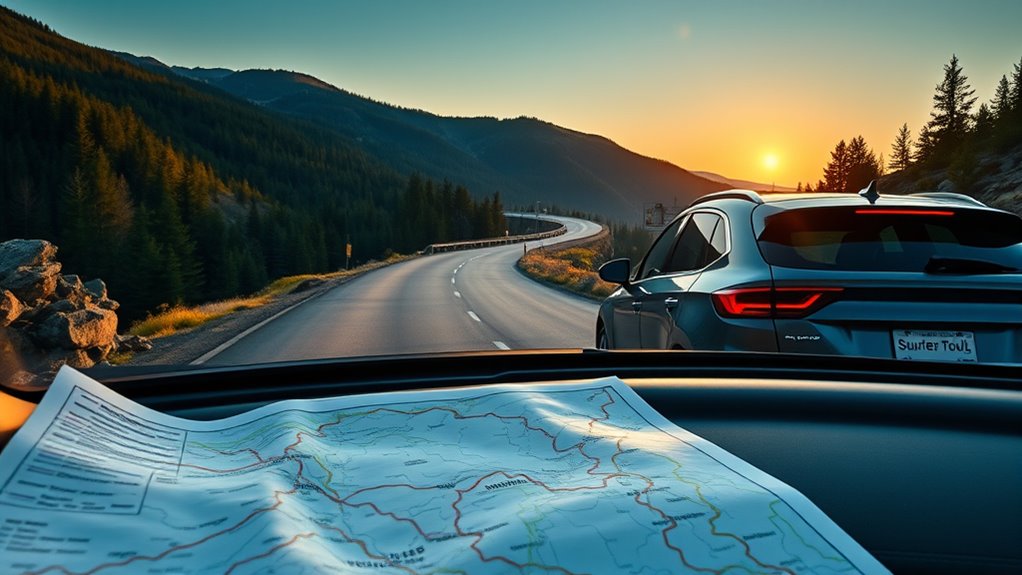
Planning your route carefully can substantially cut down on fuel waste, especially if you avoid traffic congestion and dead-ends. Use GPS apps to find the quickest, most efficient path, and check real-time traffic updates before heading out. This helps you steer clear of gridlocked areas and unnecessary stops. Additionally, plan your stops in advance to minimize idling—turn off your engine if you’ll be waiting for more than a minute. Keep an eye out for routes with fewer stoplights and more consistent flow. Remember to avoid routes with frequent detours or construction, which can lead to extra idling and fuel consumption. Proper planning ensures a smoother drive, saving fuel and reducing stress along the way. Identifying bad lemon juice can help ensure your drinks stay fresh and safe. Incorporating efficient routing strategies can further optimize your trip and reduce fuel usage. Monitoring your vehicle’s fuel efficiency during the trip can also help you make adjustments on the go to conserve fuel. Being aware of reviews and ratings of your vehicle and route options can provide additional insights into what might affect your fuel consumption.
Frequently Asked Questions
How Does Driving at Different Speeds Affect Fuel Efficiency?
Driving at different speeds markedly impacts your fuel efficiency. When you drive faster, your engine works harder, increasing fuel consumption. Conversely, maintaining a steady, moderate speed helps your vehicle operate more efficiently, saving fuel. Accelerating and braking suddenly also waste fuel. To maximize mileage, keep your speed consistent, avoid excessive acceleration, and stay within the ideal speed range for your car. This simple approach can lead to noticeable savings on long drives.
What Are the Best Ways to Reduce Aerodynamic Drag?
Did you know reducing aerodynamic drag can improve fuel efficiency by up to 25%? To do this, keep your windows closed at high speeds and remove roof racks or carriers when not in use. You should also consider adding a front air dam or a rear spoiler to streamline airflow. Maintaining proper tire pressure and driving smoothly further cuts drag, helping you save fuel on long drives.
How Can I Improve Fuel Economy in Stop-And-Go Traffic?
In stop-and-go traffic, you can improve fuel economy by driving smoothly and avoiding rapid acceleration or hard braking. Keep your speed steady, anticipate stops, and use light, consistent pressure on the gas pedal. Turn off your engine if you’re stopped for an extended period, and make sure your tires are properly inflated. These habits help reduce fuel consumption and make your drive more efficient.
Does Using Air Conditioning Impact Fuel Consumption?
Did you know that using your air conditioning can increase fuel consumption by up to 25%? When you turn on the A/C, your engine works harder to power the compressor, which uses extra fuel. If you’re looking to save, consider using the vehicle’s ventilation system or opening windows at lower speeds. At higher speeds, however, running the A/C might be more aerodynamic and efficient than open windows.
Are There Specific Driving Habits That Maximize Fuel Savings?
You can maximize fuel savings by adopting specific driving habits. Maintain steady speeds and avoid rapid acceleration or braking, as these waste fuel. Use cruise control on highways to keep a consistent pace. Additionally, reduce idling time and plan routes to avoid traffic. Keep your tires properly inflated, and remove unnecessary weight from your vehicle. These habits help improve efficiency and save you money on fuel during long drives.
Conclusion
By keeping your speed steady with cruise control, maintaining your vehicle, and planning your route wisely, you can save fuel and enjoy a smoother drive. Avoid unnecessary idling whenever possible, and your efforts will pay off. Remember, a penny saved is a penny earned—so take these simple hacks to heart. The road may be long, but with smart choices, you’ll arrive further and with less fuel in the tank.



